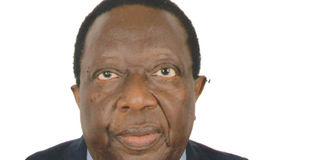Does the Constitution still mean anything in Uganda?

William G Naggaga is an economist, administrator and retired ambassador
When the United States of America won its independence in 1776 after a protracted struggle with Britain, it was a predominantly a rural country of 13 loosely confederated states and all of them conglomerated in the north-east. The rest of America had yet to been conquered or confiscated from the native Americans.
It is an irony that those who participated in colonising others fought a war of independence from colonialism. In 1789, the American Constitution, negotiated by a small group of wise men led by General George Washington, came into effect after ratification by the 13 States in the confederation.
It is the oldest written constitution of the modern world and remarkably brief with only seven articles. It has since been amended only 27 times to accommodate the changed country, which has evolved from 13 states to 50 states; from a rural economy to the most industrialised and richest nation on earth.
Its founders wrote a document for eternity and ensured that they set the example by being true to the letter and spirit of this great document. The Constitution did not have term limits, but provided for a four year-term for someone to serve as President before he subjects himself to the electorate for renewal of the mandate or otherwise. There was, however, ‘de facto’ two term-limit which become ‘de jury’ in 1951, when it was incorporated formally in the Constitution.
This was due to the unprecedented long presidency of Franklin Delano Roosevelt (FDR), the 32nd president of the United States, who served from 1933 until his death in 1945 at the start of his fourth term. Great as FDR was, Americans had no appetite for a ‘life-presidency’.
A good constitution has enabled the United States to scale heights and become the most developed country in the world.
Other countries in the American hemisphere, with the exception of Canada, have undergone upheavals, coups, military dictatorships and economic stagnation over the centuries because the founding fathers of those countries lacked the vision and commonsense of their northern compatriots.
Coming home, Uganda has had a rocky start from its independence in 1962; with an imperfect independence Constitution representing groups with varying interests i.e. federalism, semi-federalism and unitarism rolled into one.
It is little surprise that this ‘polygamous’ Constitution ended in 1967 and was replaced by Obote’s ‘pigeon hole’ constitution, which went to the other extreme of centralising power. Obote’s overthrow in1971 by Idi Amin resulted in abolition of parts of the 1967 Constitution and introduction of “rule by decree’’.
Then came the ‘mini-constitution’ in 1979 sometimes referred to as the ‘Moshi Conference Spirit’, following the overthrow of Amin by a combination of Tanzania People’s Defence Forces and an amalgam of Ugandan liberation movements.
The 30 member National Consultative Council (NCC) created by the Moshi Conference appointed and dismissed presidents such as Yusuf Kironde Lule and Godfrey Binaisa at will, regardless of the fact they were sworn in using the 1967 Constitution.
Milton Obote, who re-assumed power in 1981, returned to the 1967 Constitution and the same Constitution was in effect until 1995 when a new Constitution came into force, after extensive consultations through the Constituent Assembly (and before in Odoki Commission).
President Museveni hailed it then as the “best constitution in the world’’, but the ‘damn’ thing has been amended so often that it is barely recognisable from the original document.
What is sad is that the same government that gave it “thumbs up” is the one repeatedly ‘raping’ it! The worst amendment was the lifting of presidential term limits in 2005, which allowed the occupant of State House to rule in perpetuity until he attained the age of 75.
Now even that limitation is on the chopping block as all is set to lift the age limit. It is totally incomprehensible that we come to this even when, just over a year ago, President Museveni said he would “certainly not” offer himself to stand for presidency after attaining the age of 75 and did not entertain any amendment in this regard.
To date, the President has not said he has changed his mind. So who are these people in NRM pushing for the lifting of the age limit? Does the Constitution have any meaning in this country?
Is anyone surprised if the country is going around in circles and making the same mistakes while our people continue to wallow in abject poverty?
With a seemingly morally bankrupt Members of Parliament, how low will Uganda sink?
Mr Naggaga is an economist, administrator and retired ambassador. [email protected]




